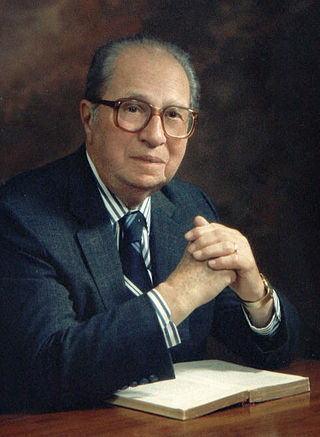
Mortimer Jerome Adler was an American philosopher, educator, encyclopedist, and popular author. As a philosopher he worked within the Aristotelian and Thomistic traditions. He taught at Columbia University and the University of Chicago, served as chairman of the Encyclopædia Britannica board of editors, and founded the Institute for Philosophical Research.

Pragmatism is a philosophical tradition that views language and thought as tools for prediction, problem solving, and action, rather than describing, representing, or mirroring reality. Pragmatists contend that most philosophical topics—such as the nature of knowledge, language, concepts, meaning, belief, and science—are all best viewed in terms of their practical uses and successes.

John Bordley Rawls was an American moral, legal and political philosopher in the liberal tradition. Rawls has been described as one of the most influential political philosophers of the 20th century.

Gertrude Elizabeth Margaret Anscombe, usually cited as G. E. M. Anscombe or Elizabeth Anscombe, was a British analytic philosopher. She wrote on the philosophy of mind, philosophy of action, philosophical logic, philosophy of language, and ethics. She was a prominent figure of analytical Thomism, a Fellow of Somerville College, Oxford, and a professor of philosophy at the University of Cambridge.
Contemporary philosophy is the present period in the history of Western philosophy beginning at the early 20th century with the increasing professionalization of the discipline and the rise of analytic and continental philosophy.

Charlie Dunbar Broad, usually cited as C. D. Broad, was an English epistemologist, historian of philosophy, philosopher of science, moral philosopher, and writer on the philosophical aspects of psychical research. He was known for his thorough and dispassionate examinations of arguments in such works as Scientific Thought (1923), The Mind and Its Place in Nature (1925), and Examination of McTaggart's Philosophy.

Cyril Edwin Mitchinson Joad was an English philosopher, author, teacher and broadcasting personality. He appeared on The Brains Trust, a BBC Radio wartime discussion programme. He popularised philosophy and became a celebrity, before his downfall in a scandal over an unpaid train fare in 1948.
African philosophy is the philosophical discourse produced in Africa or by indigenous Africans. African philosophers are found in the various academic fields of present philosophy, such as metaphysics, epistemology, moral philosophy, and political philosophy.

The American Philosophical Association (APA) is the main professional organization for philosophers in the United States. Founded in 1900, its mission is to promote the exchange of ideas among philosophers, to encourage creative and scholarly activity in philosophy, to facilitate the professional work and teaching of philosophers, and to represent philosophy as a discipline. The APA's governance has included Robert Audi, Jaegwon Kim and Ruth Barcan Marcus.
Peter van Inwagen is an American analytic philosopher and the John Cardinal O'Hara Professor of Philosophy at the University of Notre Dame. He is also a research professor of philosophy at Duke University each spring. He previously taught at Syracuse University, earning his PhD from the University of Rochester in 1969 under the direction of Richard Taylor. Van Inwagen is one of the leading figures in contemporary metaphysics, philosophy of religion, and philosophy of action. He was the president of the Society of Christian Philosophers from 2010 to 2013.

Philosophy Now is a bimonthly philosophy magazine sold from news-stands and book stores in the United States, United Kingdom, Australia, and Canada; it is also available on digital devices, and online. It aims to appeal to the wider public, as well as to students and philosophy teachers. It was established in 1991 and was the first general philosophy magazine.

The Philosophical Society of England (PSE) was founded in 1913 by a group of largely amateur 'philosophers' concerned to provide an alternative to the formal university-based discipline. The society has passed through a series of changes in direction, including a period during which it offered distance-learning courses in philosophy. These courses caused a minor academic tussle in the 1950s over the status of its diplomas of associateship, triggered by an ill-advised attempt to award them to all the then UK university Philosophy Professors an honorary fellowship (FPhS).

Socrates Café are gatherings around the world where people from different backgrounds get together and exchange philosophical perspectives based on their experiences, using the version of the Socratic Method developed by founder Christopher Phillips. The groups model their discussions from the 2001 book of the same name by Christopher Phillips and a guide he also developed. Today, there are hundreds of such gatherings, coordinated by volunteers, worldwide.
Think: Philosophy for Everyone is an academic journal created to forge a direct link between contemporary philosophy and the general public. The central aim of the journal is to provide easily accessible and engaging writing by philosophers pre-eminent in their fields to a wide audience, unimpeded by academic jargon and technicality. The journal is sponsored by the Royal Institute of Philosophy in London and published by Cambridge University Press. Think's editor is Stephen Law.
John Joseph Haldane is a British philosopher, commentator and broadcaster. He is a former papal adviser to the Vatican. He is credited with coining the term 'analytical Thomism' and is himself a Thomist in the analytic tradition. Haldane is associated with The Veritas Forum and is the current chair of the Royal Institute of Philosophy.

The Philosopher is a long running periodical, established in 1923 by the Philosophical Society of England. Originally in print format, following a split in the mid-2010s the publication now exists in two competing formats.

Café philosophique is a grassroots forum for philosophical discussion, founded by philosopher Marc Sautet in Paris, France, on December 13, 1992.

Marc Sautet was a French writer, teacher, translator, and philosopher. He was a Doctor of Philosophy at the Paris Institute of Political Studies. Sautet was a former Trotskyist who however edited two books on the German philosopher and philologist Friedrich Nietzsche. Marc Sautet emphasised that Nietzsche was a precursor of his time.
Philosophy Sharing Foundation, or PSF, is a non-profit organisation founded in Malta in 2012. Its mission is to bring together philosophy enthusiasts; to inspire, strengthen and promote philosophical activity in the Maltese Islands; and to contribute towards society through Philosophy. The foundation does not adhere to, or profess, any single creed or ideology. Its official languages are Maltese and English.
The Malta Mathematical Society (MMS) is a mathematical society based in Malta, whose aim is to increase the awareness and popularity of mathematics among the Maltese populace. It organises lectures and various events open to the general public.












